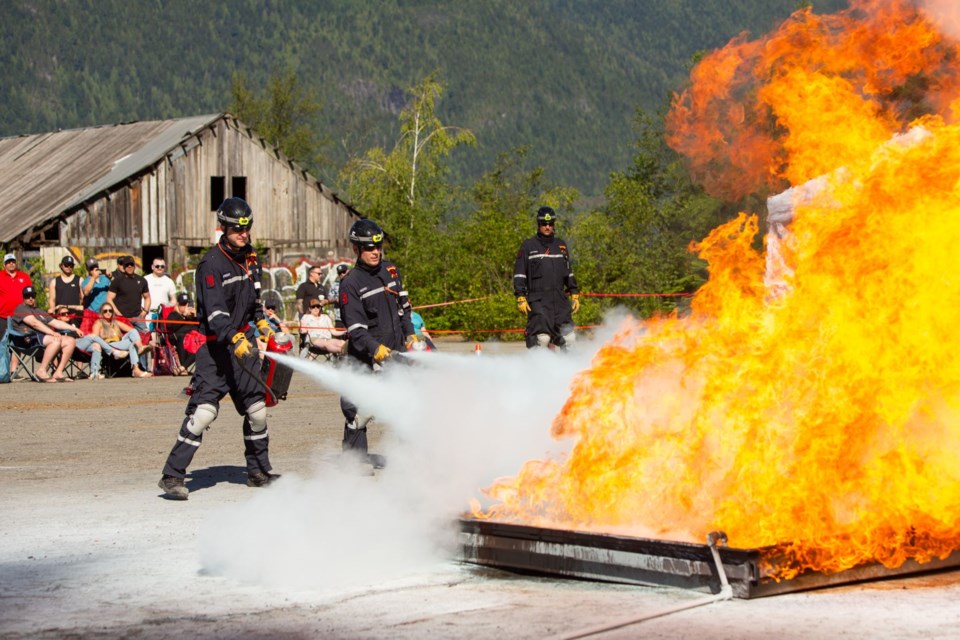Updated on June 17.
Here are the winners of each competition:
- Underground Mine Rescue: Newmont Corporation, Red Chris mine
- Surface Mine Rescue: Hudbay Minerals Inc., Copper Mountain mine
- Three-person First Aid Team: Hudbay Minerals Inc., Copper Mountain mine
“Congratulations to all teams who competed this year. Once again, I am blown away by the skill level and aptitude of the mine rescue teams in B.C.. Every major mine is required to have a mine rescue team responsible for emergency response. Safety is the top priority for B.C.'s mining operations and this past weekend demonstrated this,” said Hermanus Henning, chief inspector of mines, in a news release that announced the winners.
Michael Goehring, president & CEO of the Mining Association of BC said that mine rescuers are the "heart and soul of BC’s mining industry."
“The teams demonstrated not only their exceptional mine rescue and first aid skills, but also their dedication and passion for what they do. Well done to everyone who took part in this year’s competition," he said, in the release.
—Original story published June 8—
If an accident happens at a remote mine in B.C., miners can't depend on an ambulance or the fire department to arrive in minutes.
Thus, mine operations throughout the province each have their own skilled rescue professionals who serve as each mine’s fire department, paramedics and high-angle rescue teams.
This weekend, those teams put their knowledge to the test at the , held at Britannia Mine.
Teams from across the province competed in surface and underground mine rescues in the two-day event organized by the Ministry of Energy, Mines and Low Carbon Innovation and the Mining Association of BC.
"The mine rescue competition is an exciting event for competitors and spectators. Teams will compete in challenges, testing their skills, including firefighting, first aid, and rope rescue—all under simulated conditions. And it also shows how B.C. mining companies are working to safeguard the health and well-being not only of the mine workers but also of the local communities where mines operate," said Jayne Czarnocki, director of communications for the Mining Association of British Columbia, who was on hand for the event.
"Mining has sustained generations of British Columbians and is the cornerstone of community development. It supports people and prosperity across our province. And the annual mine rescue competition ensures that B.C. remains a world leader in mine health and safety."
Hermanus Henning, chief inspector of mines for the Ministry of Energy, Mines and Low Carbon Innovation, was at the competition and explained to The �鶹����� that the ministry is responsible for permitting—allowing people to go and do the work—and for health and safety at the operations.
Henning is responsible for the latter.
For the ministry, the competitions, which are held in different locations around the province once a year, are an opportunity to assess the teams' preparation in person.
Though incidents are rare, certainly much rarer than they were in previous generations, mining is still not a hazard-free profession. Thus, emergency teams need to be ready to jump into action, should something unexpected happen.
In addition to competing against fellow mines' teams and learning from each other, Henning said that there is a lot of camaraderie among people working in the mining industry—and their families—so the competitions are a good opportunity to spend time with each other.
Keith Winship, a health and safety manager for a B.C. mine, noted how unique and helpful it is to hold the rescue competition at Britannia Mine, a former copper mine that was in operation for 70 years.
"It is a great opportunity for the guys and gals to practice their skills," he said.
“Typically, it's more of a mocked-up scenario, but this one has been more realistic—it actually happened in a mine. So it's a good opportunity for them.”
While the competition is over, you can learn about the evolution of mining safety at the museum's “” exhibit, which is on until Sept. 2.
Find out more on the




